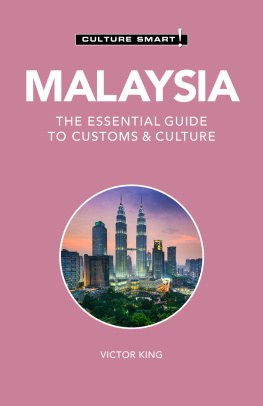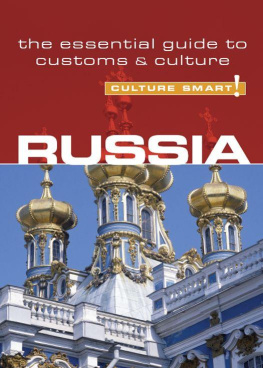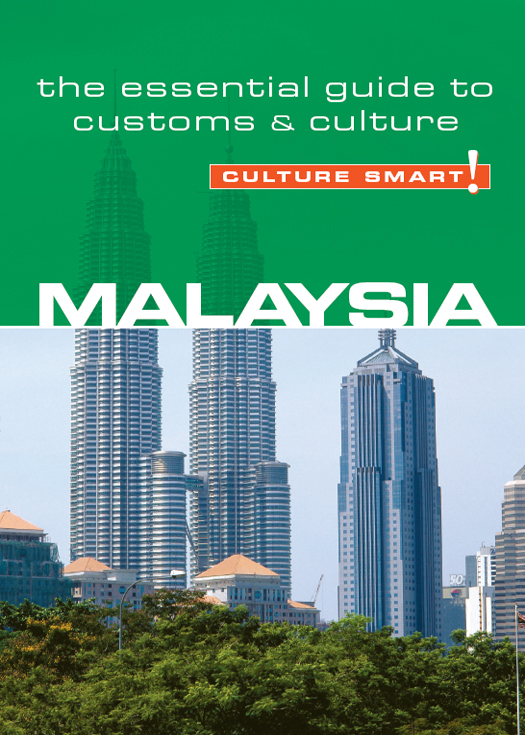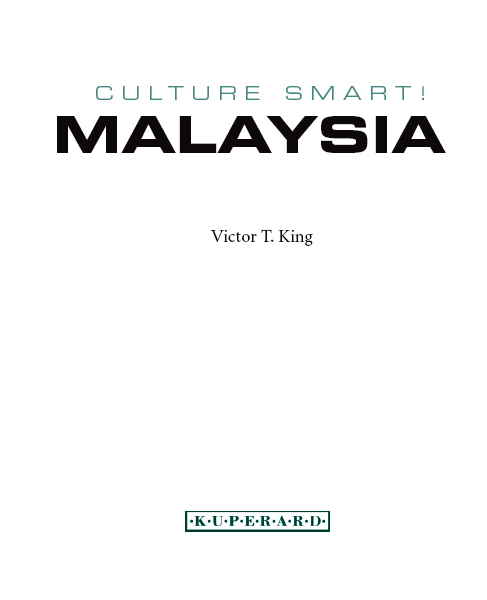eISBN: 978-1-85733-611-5
British Library Cataloguing in Publication Data
A CIP catalogue entry for this book is available from the British Library
Copyright 2008 Kuperard
All rights reserved. No part of this publication may be reprinted or reproduced, stored in a retrieval system, or transmitted in any form or by any means without prior permission in writing from the publishers.
Culture Smart! is a registered trademark of Bravo Ltd
First published in Great Britain 2008
by Kuperard, an imprint of Bravo Ltd
59 Hutton Grove, London N12 8DS
Tel: +44 (0) 20 8446 2440 Fax: +44 (0) 20 8446 2441
www.culturesmart.co.uk
Inquiries:
Series Editor Geoffrey Chesler
Cover image: The Petronas Towers, Kuala Lumpur. Travel Ink/Geoffrey Clive
Images courtesy of Tourism Malaysia
Images Henryk Kotoviski
v3.1
About the Author
VICTOR KING is Professor of South-East Asian Studies at the University of Leeds and Executive Director of the White Rose East Asia Center, a joint researchtraining venture in Chinese and Japanese Studies between the East Asian Studies departments at Leeds and Sheffield. He spent most of his career in the University of Hull, where he was Director of the Center for South-East Asian Studies, Dean of Social and Political Sciences, Director of the Graduate School, and Pro-Vice-Chancellor. He has undertaken anthropological and sociological research on Indonesia, Malaysia, and Brunei, and supervised research projects on these and other countries. A frequent visitor to Malaysia and the wider region, he has written extensively on its societies and cultures. He has recently coauthored an anthropological study of Southeast Asia, written an introduction to the sociology of change in the region, and coedited a book on tourism in Southeast Asia.
The Culture Smart! series is continuing to expand.
For further information and latest titles visit
www.culturesmartguides.com
The publishers would like to thank CultureSmart!Consulting for its help in researching and developing the concept for this series.
CultureSmart!Consulting creates tailor-made seminars and consultancy programs to meet a wide range of corporate, public-sector, and individual needs. Whether delivering courses on multicultural team building in the USA, preparing Chinese engineers for a posting in Europe, training call-center staff in India, or raising the awareness of police forces to the needs of diverse ethnic communities, it provides essential, practical, and powerful skills worldwide to an increasingly international workforce.
For details, visit www.culturesmartconsulting.com
CultureSmart!Consulting and CultureSmart! guides have both contributed to and featured regularly in the weekly travel program Fast Track on BBC World TV.
contents
Map of Malaysia
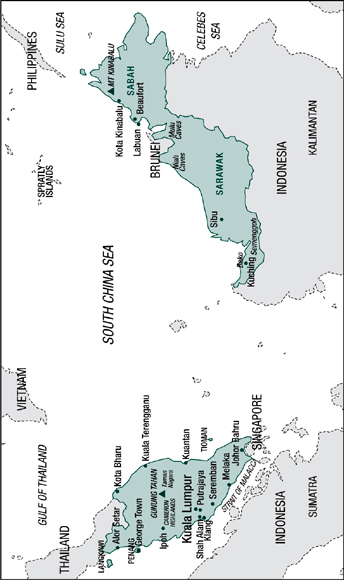
introduction
The Federation of Malaysia, a nation of 27 million people and a constitutional monarchy and democracy, is one of the successful newly industrializing countries of the Asia Pacific region. Formerly a relatively small but economically vital part of the British Empire, and a major exporter of the primary products of tin and rubber, Malaysia now has a diversified economic profile. It is still an important source of natural resources and tropical agricultural productspetroleum, natural gas, tin, copper, iron ore, bauxite, sawn timber and wood products, rattan, palm oil, pepper, coconut, pineapple, and rubberbut it is also a manufacturer of electrical and electronic goods, textiles, vehicles, and chemicals, with a growing services sector including a fast expanding tourism industry. It pursues a relatively open-door economic policy and plays an active role in regional and other international organizations.
In many respects Malaysia is a modern nation-state, and from a predominantly rural society in the immediate postwar years it has become an increasingly urbanized one. Nevertheless, elements of the traditional past remain. The country still presents the visitor with an exciting and fascinating medley of culturesMalay, Chinese, Indian, Arab, Eurasian, Dayak, and aboriginal. These communities have retained, though in a much changed form, a considerable amount of their cultural heritage, and Malaysia continues to demonstrate the virtues of a culturally diverse, exotic, and vibrant plural society in customs, religion, festivals, costume, cuisine, language, and architecture.
To help foreign visitors and residents navigate this rich and complex cultural mix, Culture Smart! Malaysia provides a succinct and straightforward introduction to Malaysian history and society. It explains the deeper core values of the different ethnic groups, and guides you through Malaysian etiquette and behavior so that you might be inclined to do the right rather than the wrong things. Human intelligence is key to successful relationships. But nothing is guaranteed in a globalized world. We all take our chances and hope that we are sufficiently sensitive to be able to survive those awkward cross-cultural moments.
This is a guide, not a definitive document on what should or should not be done in a variety of situations. Much of what is provided here is based on common sense, and assumes that when we encounter people of other cultures we all try to behave reasonably. It can tell you what might offend and what might please, but ultimately its up to the reader to respond positively to another culture, to engage, relate, interact, and understand. If you have a passion for learning about other cultures, then stay with us on this journey to Malaysia!
Key Facts
| Official Name | The Federation of Malaysia (Persekutuan Tanah Malaysia) |
| Capital City | Kuala Lumpur | Pop. 1.58 million (2006 estimate); 6.9 million (metropolitan area) |
| Administrative Capital | Putrajaya | There are 13 states: 11 on the Malay Peninsula and 2 on the island of Borneo |
| Federal States and Territories | States: Johor, Kedah, Kelantan, Melaka, Negeri Sembilan, Pahang, Perak, Perlis, Pulau Pinang, Sabah, Sarawak, Selangor, and Terengganu. Federal territory: cities of Kuala Lumpur, Labuan, and Putrajaya |
| Major Towns and Cities | Penang (George Town) (Pulau Pinang), Ipoh, Klang, Malacca (Melaka), Johor Bahru, Kuching, Sibu, Kota Kinabalu, Alor Setar, Shah Alam, Kota Bharu, Kuantan, Kuala Terengganu, Seremban |
| Population | 27.1 million (2007 est.) | Growth rate, 1.8% per annum; birthrate 22.7 per thousand; life expectancy, 72.8 years |
| Area | 127,355 sq. miles (329,848 sq. km) |
| Climate | Tropical, hot and humid, more moderate in highlands | Sea level temperature range 7791.5F (2533C) throughout the year |
| Currency | Malaysian ringgit (RM or dollar) | Approx. $ M6.9 = 1 sterling; $ M3.49=US $1 |


